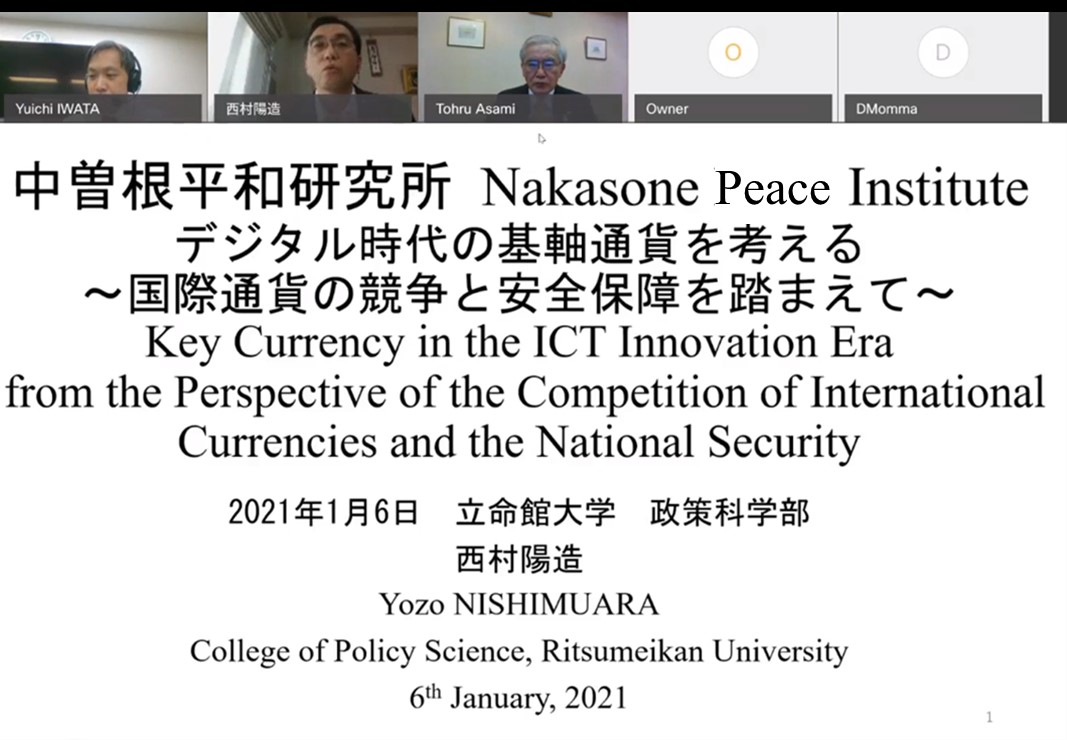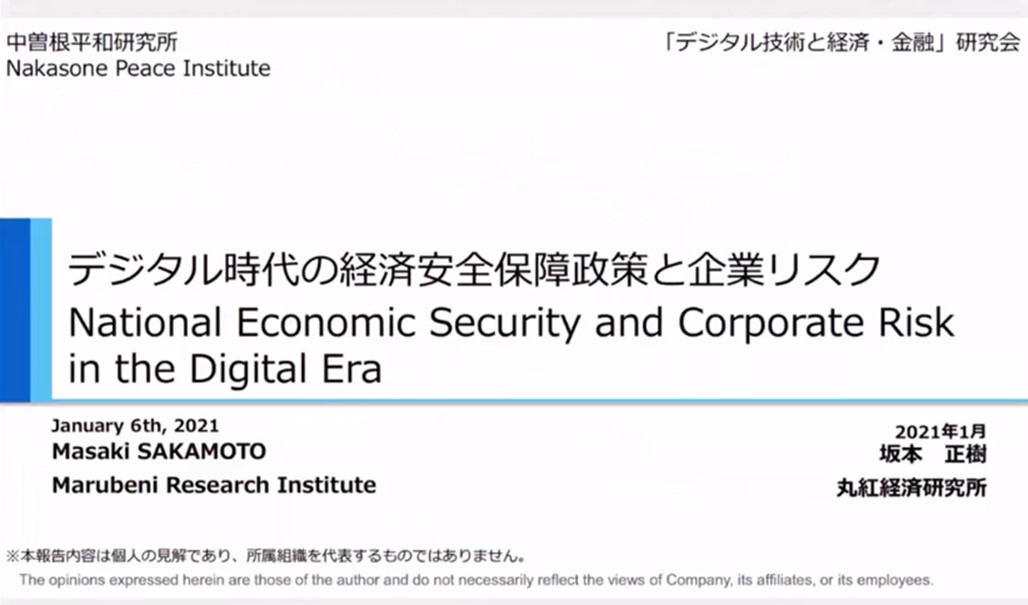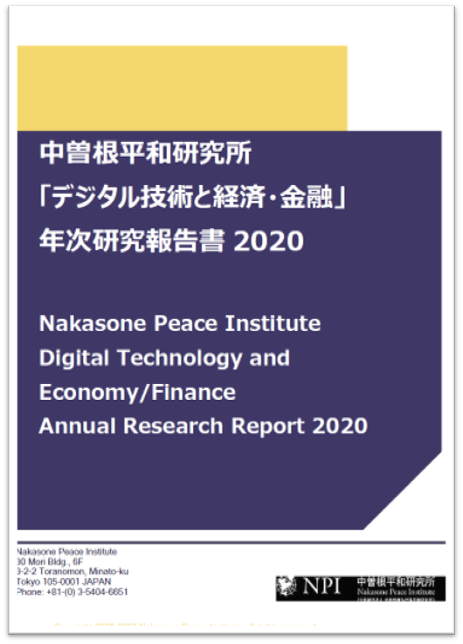2021/01/25
"What is the foundation for national security over finance and political economy in the digital age?" ("Digital Technology and Economy/Finance" Study Group)
The Nakasone Peace Institute held the web conference on "What is the foundation for national security over finance and political economy in the digital age?" with Prof. Yozo Nishimura (Professor, Ritsumeikan University) , Dr. Masaki Sakamoto (Economist, Marubeni Research Institute), and other regular members, on January 6th 2021.
1 Presentation "Key Currency in the ICT Innovation Era from the Perspective of the Competition of International Currencies and the National Security" (Prof. Nishimura)
■The Dollar Reserve Currency Regime Continues Despite Problems
Just under 90% of the world's foreign exchange transactions are in exchange for the US dollar. This situation has not changed. The ranking of the euro, the Japanese yen, and the British pound after the dollar has also not changed, although the share of the dollar is much lower. The Chinese yuan has been growing in recent years, but at less than 5%, behind the Australian dollar, Canadian dollar, and Swiss franc.
In addition, the US dollar accounts for 60% of the world's foreign exchange reserves, followed by the euro at 20%, and the Japanese yen, British pound, and Chinese yuan at less than 10%.
Furthermore, the growing demand for dollar funds in emergencies and the emergency supply of funds through swap agreements between currency authorities in response to this demand were also seen during the Lehman Shock in 2008 and the COVID-19 Shock last year.
■The impact of technological innovation in payments
In the wholesale market, digitalization is already well underway. Therefore, it is the retail market that should be focused on in the future. This includes the potential of cryptocurrencies and central bank digital currencies (CBDCs).
However, the current blockchain-based cryptocurrencies are unlikely to become the mainstay of payments in the foreseeable future, due to the need for technological improvements, the instability of value, and the lack of real names. CBDCs are also unlikely to fundamentally change the current structure of the financial system, as there will probably be a cap on the amount of money that can be held in order to prevent an electronic bank run.
As for China's digital renminbi, it will be difficult to circulate it both domestically and internationally as long as the restrictions on foreign capital transactions of the renminbi itself do not change. However, if a limited digital renminbi were to be issued for transactions between foreign countries (between non-residents), it could spread mainly in regions where China's economic influence is strong. As for Libra (to be renamed Diem by the end of 2020), which Facebook is planning to launch, rather than seeing this as a potential digital currency, it would be more appropriate to see this as a multinational private financial institution targeting Facebook users.
■Is there any possibility of future changes in the dollar reserve currency system?
There are three major factors that determine a reserve currency: a country's international influence, confidence in the currency (stability of value, soundness of the financial system), and the convenience of the currency for international transactions (low transaction costs, highly liquid markets, free foreign capital transactions). The U.S. dollar is far ahead of other currencies such as the euro, the Japanese yen, and the Chinese yuan in all three of these areas.
If a shift to a multiple reserve currency system with the euro, yuan, etc. were to occur in the future, it would be due to a change in transaction costs that would weaken the convenience of the third factor, especially network externalities. However, as mentioned in the previous section, wholesale transactions have already been digitized, and it is unlikely that retail transactions will undergo changes that will fundamentally alter the financial system.
Based on the above, four tentative conclusions can be drawn.
- The financial system, in which the central bank issues currency through private banks, is unlikely to change as a result of digitization, but the content of financial services and the entities that provide them may change as a result of digitization.
- The digitalization of payments has already been achieved in the wholesale market, thus innovation in retail payments is the key. In this context, the impact of cryptocurrencies, central bank digital currencies, and libra may be overestimated. However, innovation in retail payments remains crucial.
- If the cost of payment transactions is reduced as a result of digitalization through technological innovation, this may weaken the externalities of the network and increase the possibility of a shift from a dollar reserve currency system to a multiple reserve currency system consisting of the dollar, yuan, and euro, but for the time being the dollar will remain the sole reserve currency.
- What Japan can do to support the U.S. dollar reserve currency regime is to keep up with the tide of digitalization, promote economic growth, and strengthen cooperation among market economies, which seems quite ordinary but is not so easy to implement.
2 Presentation "National Economic Security and Corporate Risk in the Digital Era" (Dr. Sakamoto)
■What are the characteristics of economic security in the digital age?
In recent years, in the concept of economic security, the economy has shifted from being treated as an object to being treated more as a means for the pursuit, maintenance, and survival of national interests.
Furthermore, the impact of digitalization will expand the focus from "resources," "military technology," and "products" to "information and knowledge," "dual-use technology," and "services," and will make them more difficult to handle.
Many existing international export control regimes do not cover these changes in a flexible and adequate manner. However, the U.S. government's technology control regime has a wide range of coverages, including various export control regulations based on lists of items and sanctioned persons, as well as investment control regulations and immigration control regulations.
■New economic security risks for internationally operating companies
As mentioned above, in the economic security of the digital age, some of the rigid aspects of the international export control regime are being compensated for by the flexible control systems of the U.S. and other governments. Therefore, for Japanese companies that operate across multiple countries, it is challenging to keep up with not only the laws and regulations of their home country of Japan, but also those of the United States, China, and other countries. These laws and regulations are constantly being updated and becoming more complex, and it is not unrealistic to assume that if a company tries to comply with one of them, it may be caught by the other.
Companies must continue to follow up on the changes in the situation, both in terms of the control system and the judgment of legal compliance, in order to avoid the risks of not only regulatory violations and sanctions, but also business stagnation due to delays in response, as well as supply chain modification risks.
■How do government and business engage in economic security in the digital age?
In the past year alone, there have been a number of notable movements at the government level in Japan, including the enforcement of the revised Foreign Exchange and Foreign Trade Law, the establishment of a new organization for economic security, and the LDP's proposal to establish a new law for economic security. All of these actions were taken from the perspective of what Japan should do while keeping an eye on the drastic movements of other countries such as the U.S. and China.
In response to this, the corporate sector is responding by making requests to the government through industry associations and by establishing new internal economic security-related departments.
Under these circumstances, the key point for the future will be how to ensure a sound and sustainable economic security system based on the structure of "international relations - states - corporations". The form of such a system will depend on the balance of circumstances, such as whether a bipolar international management system will be formed or whether the current international regime will be loosely maintained.
3 Discussion
■Main Topic 1: Views and ideas on economic security
○The concept of economic security has existed unchanged since before World War II, but the subject matter has changed from oil, technology regulation, rare earths, to digital cyberspace.
Meanwhile, the U.S.-China relationship may not necessarily continue in a confrontational manner in the future. As China's approach to the incoming Biden administration is also apparent, we need to keep a careful eye on it.
○The U.S., Europe, China, and Russia have always acted based on the concept of a strong military at the top of the security agenda, a strong economy to support that strong military, and strong technology to support that strong economy. The recent confrontation between the U.S. and China can be understood as a move toward military practical use and military hegemony in the next 10 years.
In Japan, however, this composition is not always apparent, and private companies often feel uncomfortable with economic security and technology management issues. The Japanese government and Japanese companies may have to start thinking a little more about military security and economic security in parallel. In addition, the Japanese companies may need to develop a strategy for how to deal with the increased uncertainty and risk in the global economy, and how to maximize their own profits.
○When looking at the examples of the strengthening of export control systems in the past, such as China's rare earth regulations and the oil crisis of about 50 years ago, the movement has been more to strengthen the resilience of importing countries. In this light, various methods of economic security should be used with caution, while assessing whether the goals and means are well matched.
○Both corporations and universities have to be based in a certain country. In such a situation, the policies and policies of that nation can have a strong influence on companies and universities in terms of globalization and economic security.
○The current Xi administration has been the first to make a clear push to internationalize the Chinese Renminbi. Presumably, the government is clearly aware of the challenge to the U.S. and the U.S. dollar. At the same time, because of the high priority placing on the control of the people (residents), the government has also adopted policies that do not allow the free use of the renminbi at home and abroad.
Given this situation, it is likely that China will expand the use of the renminbi by non-residents outside the country within the scope of transactions that satisfy the conditions that the country can manage and control.
The use of the renminbi in international settlements has been growing in tandem with the rise of the Chinese economy, but it has not been growing in a straight line, as there was a temporary decline due to the tightening of capital controls by the authorities.
○In Japan, along with economic security in the digital age, it is necessary to discuss the security of digital itself.
As cyber and digitalization progresses these days, it will be necessary to prepare for emergencies on three aspects: cyber technology, digital services, and data. In each of these three areas, it would be important for governments and companies to take measures to avoid full dependence on other countries and to avoid reducing the number of domestic actors to nil. Ensuring a certain portion of areas that are not driven by economic principles alone, and at the same time, keeping the human resources involved in these activities to a minimum, etc.
○As seen in the process of selecting a private vendor for the U.S. government cloud (contracted to Microsoft), it seems that some risks must be taken into account, dealt with, managed, and selected when relying on private companies for digital infrastructure. Japan must not lag behind in terms of policy responses in this respect.
■Main Topic 2: Economic Security Risks and Resilience for Companies in the Digital Age
○If, hypothetically, the world were to become bipolar and bloc-like, as it was during the Cold War between the U.S. and the Soviet Union, and an export control system could be established based on this bipolarity and bloc, this would be, in a sense, a complete decoupling, an established, visible, and understandable world. It would make global supply chains more challenging, but it would also reduce business risks for companies in the sense that they would be clearer.
However, such a simple world will not come, and there will probably be various developments before that, where the balance between maintaining and rebuilding global supply chains will continue to be tested for both companies and related peripheral countries.
○In response to the growing uncertainty and risks in the global economy, including economic security, Japanese companies have generally been weaker than those in the U.S. and Europe in terms of the degree of recovery in capital investment, even after the Lehman shock and the economic recovery from COVID-19.
For this time, although there are differences in funding issues and the strength of the economy from before COVID-19, the uncertainty of the global economy seems to be weighing more heavily on the economy. However, the third supplementary budget at the beginning of the year included measures to promote digital and green-related industries. These measures, it is believed, will be the key to Japan's economic growth in the face of uncertainty.
■Main Topic 3: Technological innovation and stable development of the financial system
○Advantages and disadvantages of a multiple reserve currency system. While checks and balances among the reserve currency countries will have the effect of promoting sound economic management, there are concerns that a shift of funds among the reserve currencies will destabilize the global economy.
With regard to the euro, priority will probably be placed on policy management efforts to resolve the problems caused by the "incomplete currency union without fiscal integration," which became clear during the currency crisis. If the euro's presence as an international currency increases, it will be as a result.
As for the Japanese yen, it is unlikely to become a reserve currency given that its share of the world's GDP will fall further from the current 5-6%, but it will still continue to be a powerful international currency. Therefore, the challenge for Japan will be how to support the dollar as a reserve currency in order to maintain JPY's position as an international currency in a world.
○Even if the basic framework between central banks and private financial institutions does not change in the future, on the other hand, the superiority or inferiority of each country's financial system may differ depending on whether it uses digital technology well or not.
○The impact of central bank digital currencies (CBDCs) on changing the stability of the international financial system could be small. This is because of the following reasons.
(1) Even in the age of digital currencies, the only financially viable payment instruments are cash and central bank deposits, and CBDCs are expected to be subject to legal caps on their possessions.
(2) Even with the advancement of digital technology, the international financial system will never be free of anxiety because it is operated by human beings.
Therefore, it is necessary to design a financial system that is suitable for maintaining stability in the digital age.
On the other hand, there are also many opinions in the world at large that expect the use of CBDC to expand. If capital transactions by CBDCs are liberalized, it could be considered that they could grow into a block currency to some extent in the future, while taking into account the stability of value and the situation of the banking industry.
○About the processing speed required for CBDC. VISA, the world's largest credit card company, is said to be processing tens of thousands of transactions per second. Probably, digital currency settlement, especially that of the reserve currency, will require a processing capacity that exceeds this. The current processing capacity of the blockchain technology used in Bitcoin and other products is seen as extremely insufficient.
○There are various possibilities for the operator of a digital currency other than the central bank, but as long as the government, backed by its tax-collecting power, police force, and military power, issues the currency and the financial system is based on it, the state will continue to be the protector of property, including finances, regardless of the operator.
In a country like China, where major private digital payments for consumers are widely used, the policy of segregation by policy makers will also attract attention.
○Credit cards, e-money, barcode payments, loyalty programs, and other non-finance consumer payment systems and platforms are springing up all over the world, and the direction of their international interoperability will become apparent as a result of the competition among these payment methods.
■Main Topic 4: International Security Coordinating Foundations for Finance and Political Economy in the Digital Age
○As the consideration of risks to international security increases, the future direction and possibility of an international coordinating function in a multi-stakeholder scheme that transcends (links) the states and corporations involved can be referred to the G20 engagement groups, such as the C20 (civil society organizations), T20 (think tanks), and B20 (business organizations), which consist of organizations independent of the government.
While these groups can serve as a base for international coordination, in order for them to function as a coordinating body with a certain level of coercive power, the members of the group must have a cooperative relationship. Therefore, there is a concern that if the confrontation between nations, especially between the U.S. and China, becomes more severe, the relationship between corporations and other organizations will also become more challenging and cooperation will become more difficult.
〇The formation of international groupings, such as FTAs and EPAs, which are regional arrangements in global trade, do not necessarily create zero-sum conflicts as seen in block economies, but rather create positive sums through cooperation.
In 2019, the governments of Japan, the United States, and Australia launched the Blue Dot Network, an initiative to support the construction of telecommunications infrastructure in each country, with a focus on the Indo-Pacific region. This kind of collaboration among countries and governmental organizations that share the same principles to support the investment activities of other countries will also create a positive sum.
○Considering the precondition of advancing international relations based on the Japan-U.S. alliance, it seems necessary to take measures to resolve the asymmetry of legal tools between the U.S. and Japan.
In a request to the Japanese government through an industry group, the issue of extraterritoriality of US legal regulations was pointed out, but this can be resolved through the development of legal tools on the Japanese side.
〇Basic research at universities has always been open, but with the increasing focus and concern about dual-use technologies, much of basic research could be related to dual-use in practice.
In the U.S., there is a situation where technology management is strictly enforced, including the policy for foreign students. Considering the international possibilities in the future, one ideal direction may be to create an international technology management framework in the form of collective security by establishing technology-related consortiums among nations. However, the challenge is how to create a sound relationship through various discussions based on national interests (and the balance between immediate benefits and safety), with the participation of companies and universities, and the clarification of common norms.







